Best For | Best for businesses and marketers needing website traffic analysis, competitor insights, and market research. | Best for SEO professionals and digital marketers focusing on keyword research, site audits, and PPC analysis. |
Price | $199/month | $117.33/month (Billed Annually) |
Features | Website traffic analysis | Advanced keyword research |
Pros | Accurate web traffic estimates | Comprehensive SEO toolkit |
Cons | Limited free version access | The learning curve for beginners |
When choosing between SimilarWeb and SEMrush, two powerful analytics tools for digital marketers, making the right decision can significantly impact your marketing strategies.
As a digital marketer, I understand the importance of selecting the best tool to gain actionable insights and make informed decisions.
In this comparison, I will delve into the features, advantages, and differences between SimilarWeb and SEMrush, helping you determine which tool aligns best with your specific needs and empowers you to stay ahead in the competitive digital landscape.
Let’s dive in and find the perfect analytics companion for your marketing journey.

Why Do yYou Need A Solution For Market And Competition Research?
Market research is often the first step when beginning a new firm or extending an existing one into new areas. On the other hand, competitive analysis is something you should examine every few months or, at the very least, once a year.
However, if you’ve never conducted a study or have seen your business’s development stall, you must consider all possible avenues for identifying untapped market opportunities and hidden growth areas.
This growth-oriented attitude is fundamental to market and competition research. These two facets of business and marketing analysis should assist you in the following ways:
- Establish standards for performance evaluation and other relevant criteria.
- Demonstrate hidden audience insights and behavioral characteristics.
- Discover your rivals’ tactics for success.
- Identify the most significant market dangers and opportunities.
- Conduct an in-depth examination of your strengths and limitations.
- Analyze emerging market movements and significant trends.
As you can see, market and competition intelligence provide both high-level and more detailed information that may assist you in shaping and fine-tuning your marketing plans for enhancing your business’s digital presence.
This is some highly sensitive information I’m discussing. While significant businesses may afford to engage research agencies (Nielsen and Forrester) to offer industry-level insights, such engagements are prohibitively costly.
SEMrush and SimilarWeb are filled with information, but they are priced differently and provide various features.
As a result, this comprehensive comparison should assist you in determining the merits and limitations of both systems.
What is SimilarWeb?
SimilarWeb is a market/category analysis tool built as a website analytics and traffic intelligence platform.
While this is their primary focus, SimilarWeb also offers elements that may interest more general marketing professionals, like keyword research, affiliate marketing, and ad research.
Their database contains information on 100 million websites.
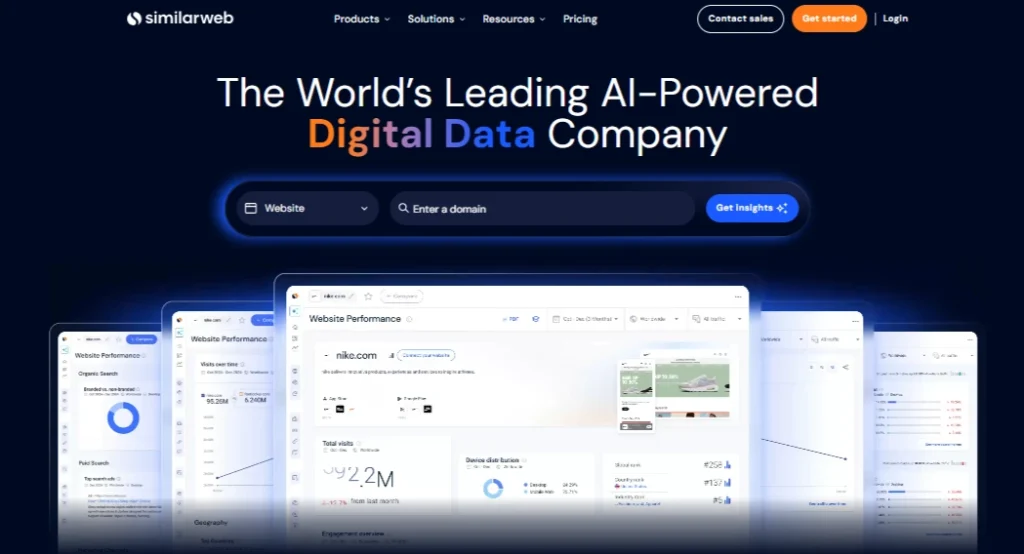
While SimilarWeb is a well-established market and competition analysis tool, it lacks several key characteristics.
And, given that SimilarWeb charges individually for each solution, I’m not sure why you’d pay separately for their keyword/affiliate/ad research skills.
SEMrush’s digital marketing capabilities are unmatched by SimilarWeb when it comes to keyword research, backlinks, and other areas of online marketing.
What is SEMrush?
SEMrush is a comprehensive platform with more than 50 tools for everything related to digital marketing.
SEMrush was built as an ecosystem of sophisticated tools to address SEO, advertising, content marketing, social media, digital PR, and competitive and market research.
SEMrush maintains the industry’s most comprehensive keyword and backlink database. Its keyword database has over 20 billion terms, making it the industry’s most significant.
SEMrush data contains 808 million domains across 142 geographic areas and has over 7 million users (and 190 countries and regions for traffic analytics).
Essentially, it’s a one-stop shop for marketing experts who run an online company and want to learn intelligent methods for optimizing the productivity of each digital channel.

SEMrush is beneficial because you receive access to practically all of its features and tools with a single subscription, except those with limited functionality.
SEMrush Vs SimilarWeb: At A Glance
| Feature | SEMrush (Winner for Depth) | SimilarWeb (Winner for Simplicity) |
| Core Purpose | A comprehensive, all-in-one marketing toolkit for executing campaigns. | A market research tool for high-level competitive and traffic analysis. |
| Keyword Research | ✓ Industry-leading tools (Keyword Magic Tool) with a massive 20B+ keyword database. Provides difficulty, CPC data, and SERP analysis. | ✓ Good for identifying top keywords driving traffic to a site, but lacks the deep research capabilities of SEMrush. |
| Traffic Analytics | ✓ Provides detailed traffic source data, audience overlap analysis, and traffic journey mapping. | ✓ A core strength. Often considered more accurate for top-line traffic estimates, especially for large websites. |
| SEO Tools | ✓ A complete suite including technical site audits, backlink analysis, position tracking, and on-page SEO checkers. | ✖ Not an SEO tool. It provides SEO-related data but lacks technical audit or deep backlink analysis features. |
| Advertising & PPC | ✓ In-depth tools for researching competitor ad copy, display ads, PLA research, and building PPC campaigns. | ✓ Good for seeing top paid keywords and an overview of a competitor’s advertising strategy. |
| Content Marketing | ✓ Offers a full platform for topic research, SEO content writing assistance, and content performance tracking. | ✖ Does not offer content creation or optimization tools. |
SimilarWeb Vs SEMrush: Features Comparison
1. Analyses of the Audience and Demographics:
SEMrush enables you to see how your audience compares to your competitors. Additionally, you may evaluate audience overlap across up to five websites simultaneously by utilizing SEMrush’s Traffic analytics tool.
Additionally, you have access to demographic information about your audience, such as their gender and age, as well as their particular hobbies and favorite brands.
On the other hand, SimilarWeb examines demographics but does not analyze audience overlap.
2. Accuracy of Traffic Estimation:
The integrity of these tools might readily be questioned, given they do not depend entirely on data supplied by specific websites. Rather than that, they draw on several sources, as described above.
However, how precise are SimilarWeb and SEMrush? This case study from OWOX should enlighten you on this critical point in the SimilarWeb versus SEMrush conflict.
The accuracy varied significantly according to the research, which reviewed SEMrush and SimilarWeb data on 787 websites and compared it to Google Analytics data.
SimilarWeb traffic data exhibited a higher standard deviation and did not align with Google Analytics data. However, it was not uncomplicated for SimilarWeb.
While traffic statistics from high-volume websites (those with over 1 million sessions) were more accurate, websites with less than 100,000 visitors showed up to a 45 percent variance from Google Analytics data.
Additionally, the analysis suggests that SimilarWeb is more accurate than SEMrush when evaluating data from websites with at least 500k visitors, with a margin of 9 to 12 percent.
SimilarWeb is also more accurate than SEMrush at evaluating website traffic on low-traffic sites, albeit both displayed “significant flaws,” according to the analysis.
As a marketer or blogger, keep your expectations in check when using either tool for competition research on low-traffic sites. This is true even for high-traffic areas with over a million monthly sessions.
From these stats, it’s evident that each tool has its own set of strengths and shortcomings in terms of accuracy since they use various methods and processes for data collection and analysis.
The data indicate that SEMrush and SimilarWeb are reasonably accurate. However, the latter often underestimates traffic.

3. Analyses of Traffic Sources:
SEMrush and SimilarWeb both provide the exact data for traffic source analysis.
You can obtain an estimate of traffic to any particular website, including its sources such as organic search, direct traffic, referral traffic from other websites, sponsored search, and traffic collected via social media channels.
Additionally, the SEMrush traffic analysis tool provides additional information about a website’s traffic journey or how it produces traffic.
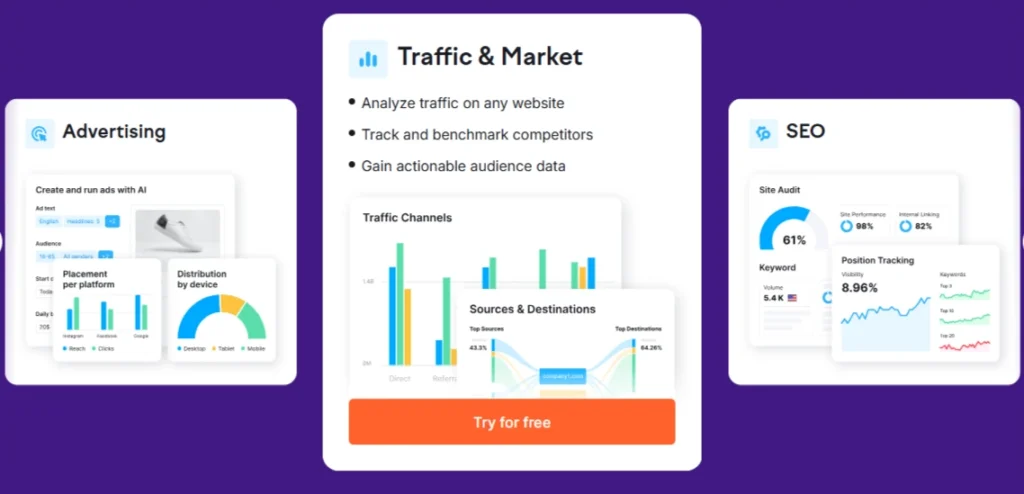
Further, it breaks out referral traffic by source, indicating which sources drove traffic to a specific website page on a domain. You may examine traffic to a subdomain of a website.
4. Source of Information:
SimilarWeb derives its data from several different sources. The platform collects data directly from website owners, partners, and public data sources, as well as anonymous behavioral data from its contributory network.
When all of the information is combined, SimilarWeb attempts to maximize the strength of each data source to provide the most accurate result.
SEMrush, on the other hand, collects data via the use of machine learning algorithms and data from third-party sources.
Additionally, it employs various data collecting techniques, depending on the data kinds and accompanying databases.
Given that the two tools collect data in distinct ways, it makes sense to determine which is more accurate. That will come later.
5. Available Resources:
Beyond SEO, SEMrush offers many tools for content marketing, competitive analysis, PPC, and social media marketing.
SimilarWeb’s features are mainly used to provide basic web statistics, such as total traffic and traffic channels.
While SimilarWeb’s subscription membership does provide specific extra capabilities, the company’s primary emphasis remains on traffic analysis.
SimilarWeb Vs SEMrush: Keyword Analysis
Keywords are essential for content success, and keyword research is vital for visibility. SimilarWeb’s keyword analysis helps businesses identify the best keywords for SEO and content strategies.
It tracks keyword performance, revealing which websites gain or lose traffic based on specific keywords. You can also discover top-performing websites, competitor insights, and potential content opportunities.
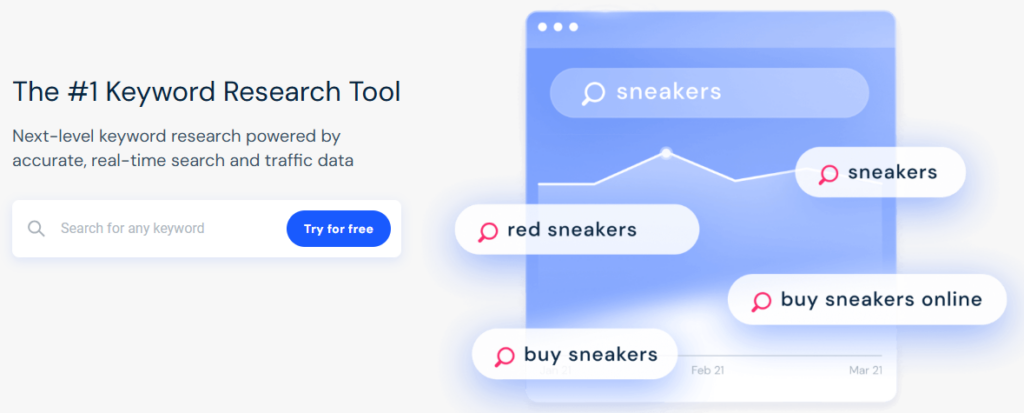
Simply input a keyword with a chosen time frame and location to view traffic data, filtered by organic or paid competitors. You can also assess keyword demand with CPC calculations and monitor traffic trends with the traffic share graph.
Enter up to 200 keywords, and SimilarWeb provides a detailed analysis filtered by demographics, country, and time period. It offers insights into successful landing pages, unlike SEMrush, which focuses on organic keywords.
SEMrush evaluates keywords based on their searches, competitiveness, and total traffic produced. SEMrush offers a one-of-a-kind tool that they refer to as a “keyword magic tool.”
This tool does exactly what the name implies: it identifies minor differences between you and your rivals and leverages this knowledge to propel you ahead of them.
Both SEMrush and SimilarWeb provide data on both paid and organic keywords. They recommend the ideal keywords for their campaign.
They both provide information on your rivals and compare you to them, highlighting areas where you fall short and offering suggestions for improvement.
Both are instructive, providing you with the means and opportunity to learn about more subjects. Particular terms denote these other domains. Additionally, you will get an understanding of traffic creation and its implications.
SimilarWeb takes it a step further by displaying the optimal landing page for your search term. On the other hand, SEMrush performs most of its functions via the audit tool, the keyword magic tool, and various tools.
SimilarWeb Vs SEMrush: Pricing Comparison
The pricing models of SEMrush and SimilarWeb clearly reveal their different philosophies. SEMrush is priced as an all-in-one toolkit with bundled features, while SimilarWeb is priced as a market intelligence platform where you pay for deeper access to data.
SimilarWeb Pricing
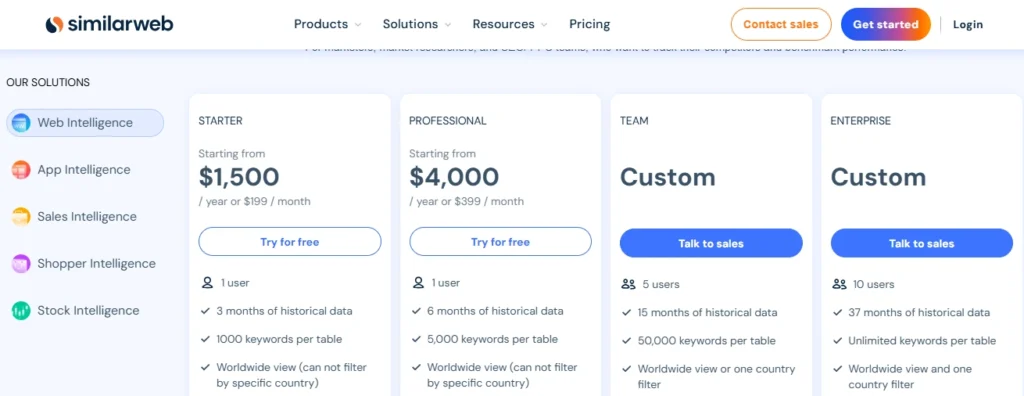
SimilarWeb’s plans are geared towards market analysis, with costs increasing based on the depth of data you need access to.
- STARTER Plan
- Price: Starting from $1,500/year (or $199/month)
- Includes: 1 user, 3 months of historical data, 1,000 keywords per report.
- Key Limitation: Data is worldwide only; you cannot filter by a specific country.
- PROFESSIONAL Plan
- Price: Starting from $4,000/year (or $399/month)
- Includes: 1 user, 6 months of historical data, 5,000 keywords per report, and access to Rank Tracker, Backlinks, and Site Audit tools.
- Key Limitation: Data is still worldwide only; you cannot filter by a specific country.
- TEAM & ENTERPRISE Plans
- Price: Custom (You must talk to their sales team)
- Includes: These higher-tier plans add more users, much longer historical data, country-specific filtering, subdomain analysis, API access, and other advanced features.
Analysis: SimilarWeb’s entry-level plans are powerful for global market overviews, but the lack of country-specific data is a major drawback for most digital marketers who need to analyze a specific market like the US or UK.
SEMrush Pricing
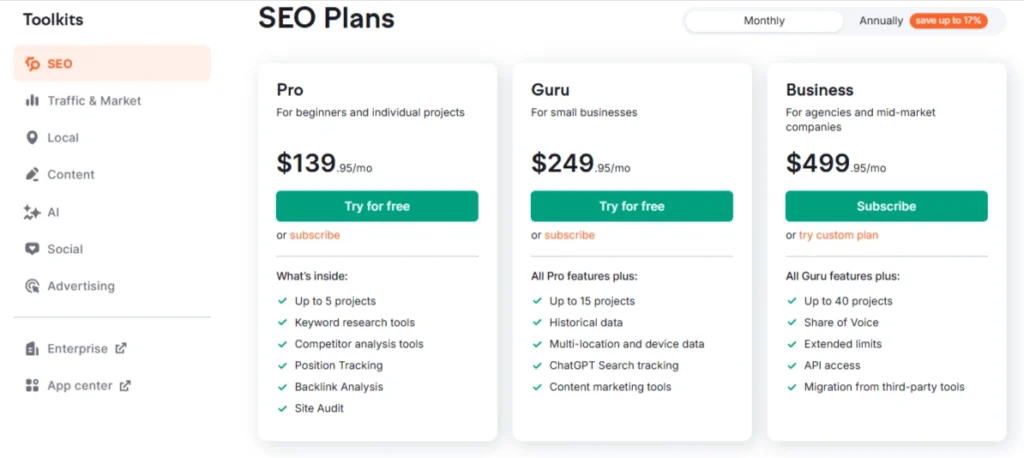
SEMrush structures its plans as a complete toolkit, with each tier unlocking more features and higher usage limits.
- Pro Plan
- Price: $117.33/month (billed annually) or $139 month-to-month
- Best For: Beginners and individual projects.
- Includes: Up to 5 projects, full access to Keyword Research, Competitor Analysis, Position Tracking, Backlink Analysis, and Site Audit tools.
- Guru Plan
- Price: $208.33/month (billed annually) or $249 month-to-month
- Best For: Small businesses and marketing consultants.
- Includes: All Pro features, plus up to 15 projects, historical data, and access to the Content Marketing toolkit.
- Business Plan
- Price: $416.66/month (billed annually) or $499 month-to-month
- Best For: Agencies and mid-market companies.
- Includes: All Guru features, plus up to 40 projects, extended limits, Share of Voice metrics, and API access.
Analysis: SEMrush’s plans are designed to be an all-in-one solution. From the very first paid plan, you get access to the core suite of SEO tools needed to execute a campaign.
SEMrush Vs SimilarWeb: Customer Testimonials
SEMrush Customer Testimonials
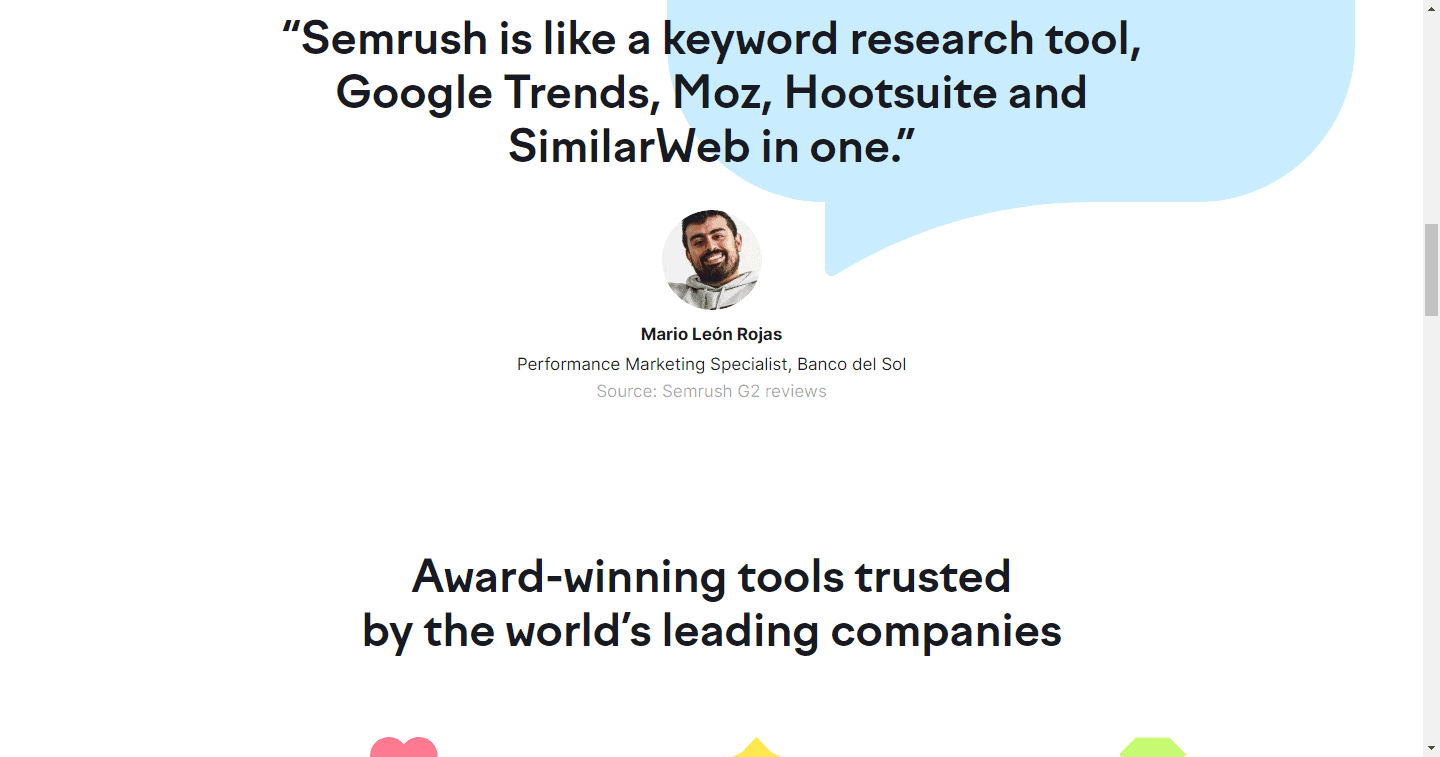
SimilarWeb Customer Testimonials

SimilarWeb Vs SEMrush : Pros and Cons
SimilarWeb
Pros
- Easy access to data on user segments
- Assists in creating new business categories
- Provides understandable traffic and keyword statistics
- Simple and visually appealing graphs
- In-depth traffic analysis across different countries
- User-friendly interface
Cons
- Limited features in the free plan
SEMrush
Pros
- SEO and SEM performance insights
- Comprehensive competitive research
- SEMrush Sensor for volatility score
- User-friendly interface
- Wide range of valuable features (Keyword Magic Tool, site audit, PPC keyword tool)
Cons
- The user interface can be technical and less user-friendly
SimilarWeb Vs SEMrush FAQs:
1. Which tool is better for keyword research?
SEMrush is far superior for keyword research. Its Keyword Magic Tool, massive database, and detailed metrics (like keyword difficulty) are built for SEO professionals. SimilarWeb can show you what keywords a site ranks for, but it’s not a research tool.
2. Is SimilarWeb or SEMrush more accurate?
It depends on what you are measuring. SimilarWeb is generally more accurate for estimating a website’s total monthly traffic. SEMrush is more accurate and reliable for SEO-specific data, such as search volumes and backlink profiles.
3. Can I use SimilarWeb for SEO?
No. SimilarWeb can provide context for an SEO strategy (like identifying top traffic-driving keywords for a competitor), but it lacks the essential tools for technical site audits, backlink building, or rank tracking that are required for a real SEO campaign.
4. Which one is more affordable?
For the number of features you get, SEMrush offers significantly better value. A single SEMrush subscription provides access to a complete marketing toolkit for a price that might only get you a fraction of that functionality with SimilarWeb’s custom plans.
Quick Links
- SimilarWeb Vs Google Analytics
- Best SEMrush Alternatives
- Semrush vs Serpstat
- SimilarWeb Vs ComScore
- Sitechecker Pro Vs Semrush
Final Verdict: SimilarWeb Wins: SimilarWeb Vs SEMrush 2026 ✅
I’ve always been a strong supporter of both options. I used to believe that SEMrush was created for everything digital marketing (from sophisticated SEO to content management and beyond).
But when it came to doing higher-level market and competition research, I’d still utilize SimilarWeb.
However, having used the SEMrush Trends package for me, I can attest that it is just as robust and intuitive as SimilarWeb.
This means that when it comes to price transparency (which I like) and the most excellent value for money, SEMrush seems to be the better choice.
This is not to say that SimilarWeb is an unworthy platform – it might be ideal if you want a few functionalities backed up by high-quality data.
In this manner, you may have highly personalized access to a limited number of specific features and proceed with this decision.
Double-check the final price structure to ensure it is comparable to Semrush’s basic plan plus. Trends: why would you pay the same fee for fewer tools and features?


